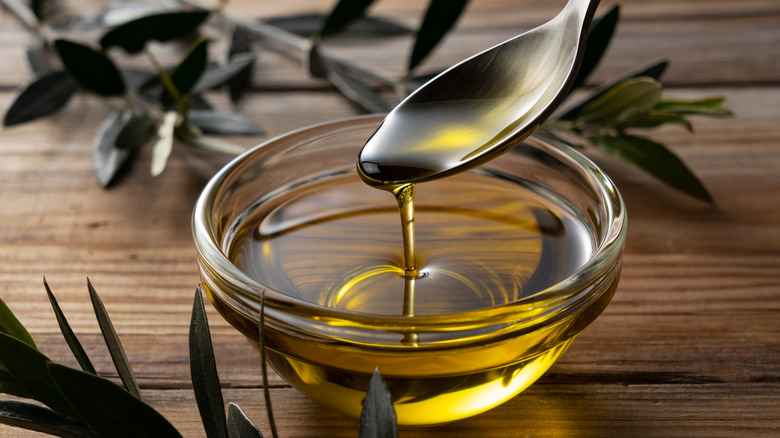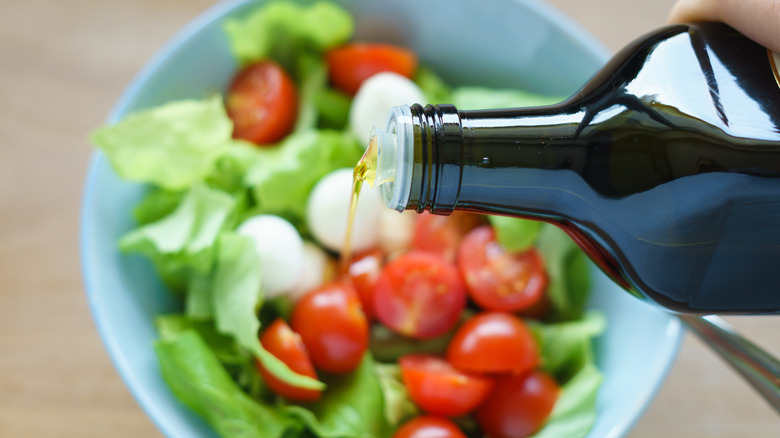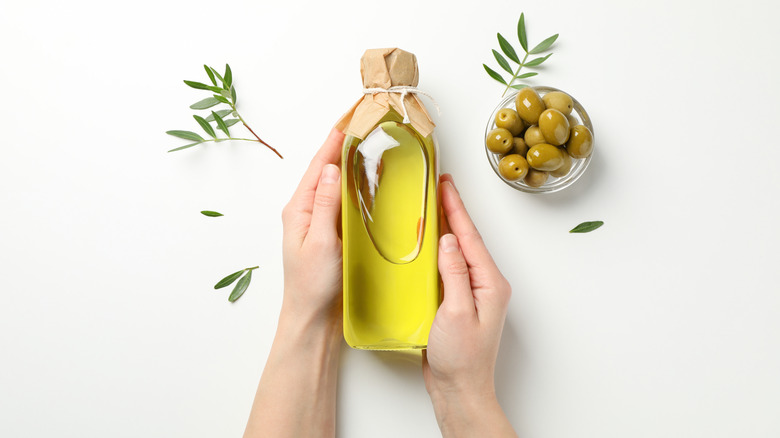Vegetable Oil Vs Olive Oil: What's The Difference?
For the longest time, shopping for cooking oil really meant you were buying vegetable oil. You could use vegetable oil for anything — deep frying, sautéing, grilling, baking, marinating — you name it. But, if you go to a grocery store now, it's a completely different story. There's avocado and coconut oil, sunflower, mustard, and palm oil, peanut, sesame, and canola oil — and that's not even the beginning. But the ones that really jump out at you are vegetable oil and olive oil.
Vegetable oil is a plant-based oil. Plant-based oils are extracted from plant sources like nuts and seeds and vegetable oil is made by blending various plant oils. Typically, vegetable oil contains oils like sunflower, canola, soybeans, and corn oil, however, there can be many more that go into its making (via Greatist). Olive oil, on the other hand, is extracted only from pressed olives.
Despite the different sources, both vegetable oil and olive oil are, well, oils. Which one then, should you use? While both vegetable and olive oil will do the job, there are plenty of differences between the two, making one more ideal than the other, depending on what you want to use the oil for, that is.
What is vegetable oil and when should you use it?
Vegetable oil is extracted from various plant-based sources like nuts, seeds, and grains. Not only is the oil extracted from different parts of plants, but the oil itself is a combination of various sources. Vegetable oil can be a mix of sunflower and canola oil, grapeseed oil, and corn oil, or even a mix of all of these together.
Both olive oil and vegetable oil go through a process of heating before being extracted from plants and also require the addition of chemicals to get rid of impurities (via Greatist). However, since vegetable oil is a blend of multiple oils, it requires considerably more processing than olive oil. The processing lowers the number of antioxidants present in vegetable oil and is the reason why vegetable oil is a neutral oil, that is, it does not have a flavor of its own. This makes vegetable oil a better choice if you do not want the oil to affect the flavor of your final dish. Vegetable oil also has a higher smoke point than olive oil, and so, it's a better oil to use for high heat cooking like deep frying, stir-frying, and searing (via Spoon University).
What is olive oil and when should you use it?
Although olive oil also goes through some amount of processing and contains chemicals, olive oil is extracted from a single source, olives. This means that olive oil is less processed than vegetable oil and, of all the varieties of olive oil, extra-virgin olive oil is the one that's processed the least and is consequently considered to be one of the healthiest cooking oils (via Healthline).
Unlike vegetable oil, however, which has a cleaner flavor, olive oil has a distinct flavor of its own (via Spoon University). When you are adding it to a dish, be prepared for a subtle buttery, peppery, and olive-like flavor in your food. This addition of flavor makes olive oil an ideal choice for salad dressings and sautéing, as well as using it as a side for dipping or drizzling it onto a dish to finish it off with an extra depth of flavor. When baking, however, it's best to stick to a neutral oil, like vegetable oil, so that the oil does not change the flavor of your bakes. That's if you aren't baking an olive oil cake, of course.
Is olive oil healthier than vegetable oil?
Because olive oil undergoes a lesser amount of processing, it's essentially healthier than vegetable oil. Healthline explains that oil loses nutrients the more that it is processed. Since vegetable oil undergoes a lot of processing, it lacks the micronutrients and healthy compounds that olive oil contains. Extra-virgin olive oil is the least processed olive oil, and thus, it contains monounsaturated fats that have anti-inflammatory properties and nutrients like vitamin K and E, as well as antioxidants.
The website also notes that olive oil may be beneficial for heart health, brain health, and can improve cognitive function in older people. Vegetable oil, on the flip side, has all the calories that olive oil has without its nutritional profile. A 2015 research from the National Library of Medicine found that, while vegetable oil has no direct link to breast cancer, consuming olive oil might actually protect against not only breast cancer, but also colorectal and skin cancer. If you do want a healthier swap for vegetable oil, olive oil — extra-virgin olive oil, in particular — seems like the healthier option.



